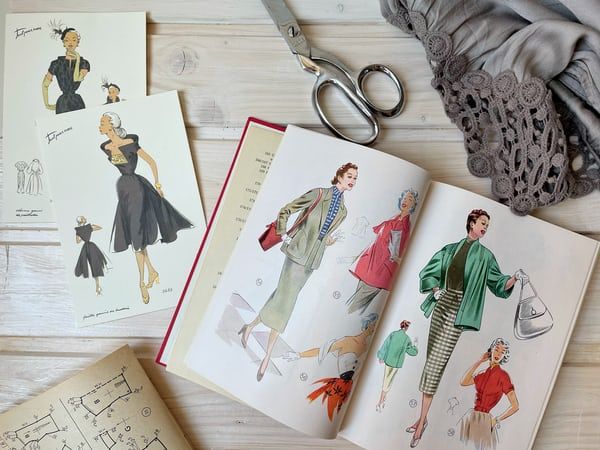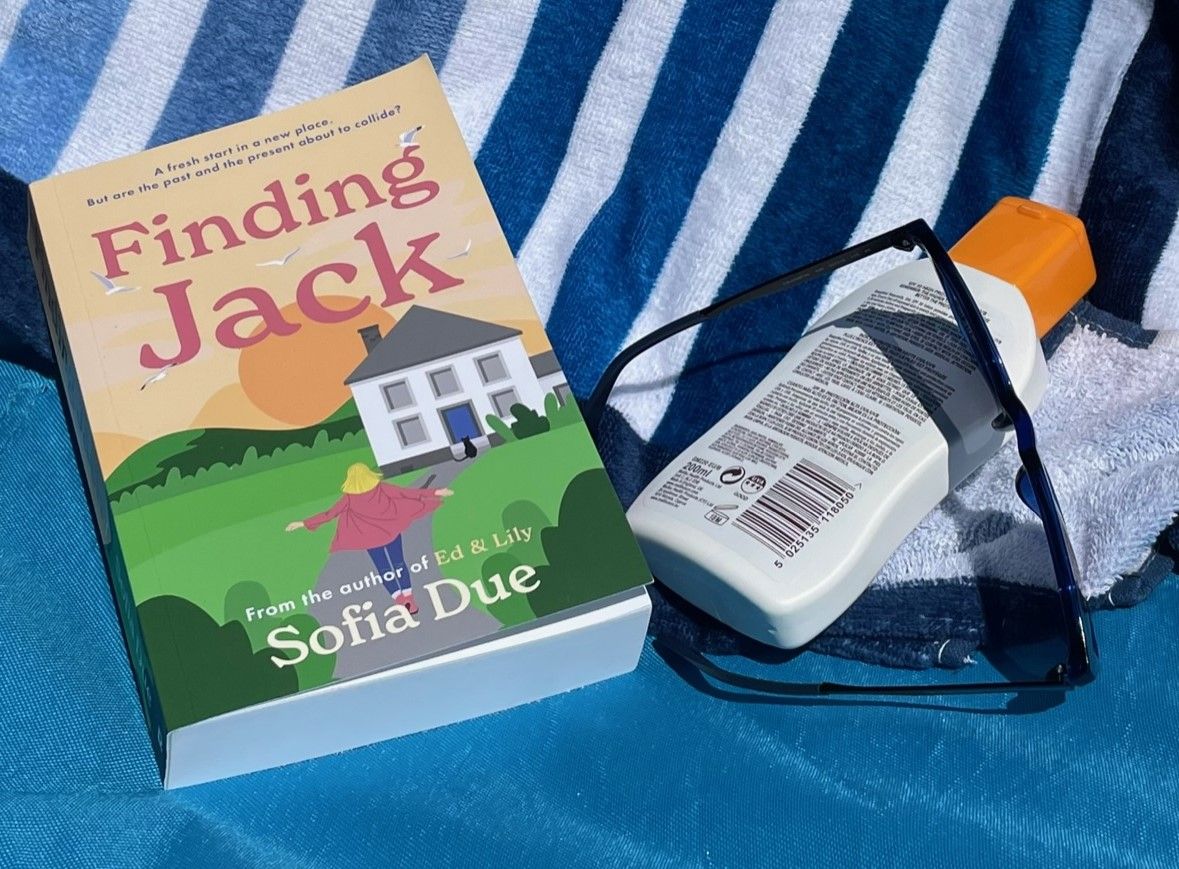The pattern cutter

The Pattern Cutter
A short story by Sofia Due
If Helen kept her eyes closed, she was still in Paris, in the tiny second floor flat with its high ceilings and creaky plumbing. The wallpaper, creamy white with birds and climbing vines picked out in blue, adorned the panels of the doors and wardrobes too. Pretty, no other purpose.
She would jump out of bed, unhook the wooden shutters and throw the balcony doors open to the hazy morning sunshine, the distant hum of the rush hour, interrupted now and again by the high-pitched whine of mopeds. The sound of youth, of hope, excitement. All she had to do was hop on the back.
Who was she kidding? It was years since she stepped over the seat of a moped and she’d never been a fan. She could count the trips on one hand. The Metro was so much easier and didn’t wreck your clothes. And as for leaping across the room, well, her back put paid to that. All those hours bent double over a cutting table, it was surprising she didn’t have a hump.
Even if her bed was the warmest place to be, she couldn’t stay there all day. She would not give in to that, she thought, gritting her teeth and pulling herself upright. She eased her legs over the edge of the divan, placing each foot on the worn green carpet, waiting for the aches to settle, averting her eyes from the yellow-stained walls, the legacy of decades of her mother’s smoking.
Maybe no-one rode mopeds around the 2nd arrondissement anymore, anyway. Perhaps it was all bicycles like the boys in the car park three floors below her, the ones she saw circling like sharks when she opened her kitchen window and peered out. Not that you could open them more than 4 inches, so afraid were Haringey council of intruders climbing in. Or tenants jumping out? She was being silly. The view might be dispiriting, rows of uniform tower blocks, the occasional balcony cluttered with laundry and dying plants, but at least the sun was shining.
If she could bear to pick her way down the communal staircase, holding her breath against the stink, and run the gauntlet of the sixteen-year-olds with nothing better to do than smoke and catcall, she could escape the estate and find a pavement café where she’d sit with a cappuccino and celebrate the brightness of the morning.
The coffee was good nowadays, even if it was the same four chains duplicated wherever she went. When did everything get so bland, so samey? Labels on show, mass production, quantity over quality. She wasn’t against progress or innovation, quite the opposite, but she mourned the passing of individualism, the cult of the particular. She missed being at the cutting edge, missed having that extra ‘e’ at the end of her name. There was no artistry anymore. Designs drawn in frothed milk were as good as it got. She stirred more sugar into her cup as she did a quick sweep of the shop, always on the alert for someone who might be interested in buying her lunch. Today, or some other day.
Her mother called her a snob. She thought a girl from a council flat in Tottenham had no business dreaming of the Champs-Elysees. If she wanted to work in the rag trade, she could do it in the East End, or Soho if she must. She would never accept that Helen’s inability to compromise, to accept less than the best in herself or anyone else, had served her well. It was what made her so good at her job, so popular with clients and designers. And so crap at the rest of her life. But if she had it all to do again, she wouldn’t change a thing - in most respects. She counted the change in her purse. Enough for coffee, no croissant, and even that was pushing it.
Helen rebuttoned her jacket, scrutinising her reflection in her pocket mirror as she fixed her scarf in place, her concentration so total she almost missed the sound of her name.
Kayleigh, her neighbour, was standing just the other side of the rope barrier which separated the patrons. She was in full young mum getup - trainers, leggings and baggy striped t-shirt, hair scraped up in a bun. The child in the front, Mabel was her name, screamed and kicked as if she was being abducted.
‘How are you, Kayleigh? How’s your mother?’ Helen asked, and not only so no-one nearby would mistake her for the young woman’s mother, or God forbid, the awful child’s grandmother.She wanted to know. She hadn’t seen either of them since the ambulance had left with Karen, blue lights flashing, two days ago.
‘Not good,’ Kayleigh said, and waited.
Helen got to her feet. She’d have to walk back with them now.
‘I need to get her home,’ said Kayleigh. ‘She’s getting worse in there.’
Helen tended to agree. Even if Karen’s return was temporary, it was important she made it home. For one thing it would silence the gossips in the neighbouring flat who’d have a field day with the notion that within minutes of Kayleigh moving back to care for her mum, she’d shipped the old dear off to a home. Tenancies of these flats, ugly as the buildings were, were like gold dust. Helen wouldn’t be one to judge her. She’d done pretty much the same, exchanging caring for her mother for a roof over her head. Eight years, she’d done, when the couture house closed, and she’d been forced home from France. Tail between her legs her mum had said, but that was far from the case.
‘Let’s make it nice for her, for when she gets back. I’ll help you,’ said Helen, as if the thought had only that moment occurred to her. ‘She’d let things go a bit. I did as much as I could, but…’
‘It hasn’t been easy,’ said Kayleigh defensively, glancing in the direction of Mabel, red-faced from screaming and rocking recklessly in her buggy.
‘Oh, I didn’t mean that,’ said Helen. Far be it from her to suggest any degree of neglect. ‘People are stubborn. They won’t ask. Did she tell you I was making her some curtains?’
‘Yeah, she mentioned it, though she said she didn’t see the point anymore.’
‘She’s feeling a bit low, that’s all. With new curtains and a lick of paint, that room will be transformed,’ said Helen. ‘And if you’re planning to stay for a while, you’ll want to brighten it up a bit. For the little one.’ She smiled, hiding her teeth and the crown that needed replacing.
They reached their block. Helen waited with Kayleigh for the lift, although usually she’d have taken the stairs.
‘Shall I get them?’ Helen said, when she stepped inside. ‘The curtains? They’re finished apart from the hem. I could measure it now.’
Kayleigh hesitated.
‘It would be a nice surprise for your mum.’
‘Okay.’
The younger woman shrugged and heaved the pram onto the landing. She unlocked her front door and manoeuvred her daughter into the sour-smelling hallway.
Helen entered her own flat and scurried into the sitting room, navy court shoes clacking on the laminate floor, to grab her box of pins and a tape measure. She retrieved the pile of carefully folded fabric from the armchair, smoothing it and clutching it to her as she paused for a moment in front of the mirror. The sooner Karen came home the better.
‘Here we are,’ Helen sang out as she picked her way along her neighbour’s hallway, navigating the mess of drying clothes and children’s toys. So different from her own minimalist interior – emptied of all but the bare essentials. Needs must.
Kayleigh settled her daughter in front of the television as Helen stood on a kitchen chair to remove the old curtains, the flower pattern so greasy and faded it was barely discernible. She reached up again, inhaling to control the twinge in her back, to hook the new pastel coloured chintz in place. At least her fingers were still nimble, no arthritis or tremors there.
‘We need to let them hang for a while,’ Helen said, one hand on the back of the chair to ease her way down. ‘Shall I put the kettle on?’
She was in the kitchen before Kayleigh could object. She knew her way around the place as well as she did her own.
‘Tea?’ she called.
‘Coffee, please.’ The young woman seemed willing enough to let her get on with it. ‘I think there’s still some left.’
Helen took two mugs down from the cupboard and opened the tea caddy. There weren’t enough teabags for her to take more than a couple without it being noticed. She undid the button on her blouse and slid the teabags inside her camisole, keeping the conversation going all the while.
‘Let me know if you need help with shopping. I’ve been doing it on and off for your mum and it’s no trouble.’ She had to go out for herself after all, timing her trips to coincide with her neighbour’s needs, buying as much as she could on offers - a half price here, a three for two there. Karen didn’t seem to notice if she ended up with only two of the three, the cost to her was the same. Ironic how Helen thought of Karen as an old lady when she was actually a couple of years younger.
‘Here we are,’ said Helen. She placed the mugs on the table with a plate of digestives.
It was presumptuous to have opened the packet without an invitation. Karen would have thought so, though she always offered, in the same way she always offered tea and Helen always accepted, grateful for the milk, a luxury she’d stopped buying for herself. It wouldn’t do to be the first to take a biscuit, although her rumbling stomach could probably be heard from Edmonton. She slid the plate towards Kayleigh as she picked her box of pins up from the table and went to the window to start on her task.
‘Go on, you need the sugar,’ she said. ‘It’s good for stress.’
Kayleigh shook her head. ‘I’m trying to be good.’
‘I used to cut patterns for Jean-Paul Gaultier, you know,’ said Helen, trying not to mind that Kayleigh hadn’t pushed the plate back in her direction. ‘Among others.’
‘I know.’ Kayleigh slumped on the sofa as her daughter sat at her feet transfixed by some primary coloured cartoon character or other. ‘You told me about it when I was little. I remember you came back one summer and made dolls’ clothes with me, tiny versions of designer models. You made me think I could do that, work in Paris or New York, and not just picking up pins either. I could design for movie stars and supermodels. Be a female Christian Lacroix.’ She rolled her eyes at her naivety.
Helen didn’t remember. That must have been when she thought she’d be living that life forever.
‘I studied fashion too,’ Kayleigh said, watching as Helen tugged and fixed the fabric, steel pins protruding from the side of her mouth.
‘I didn’t know that.’ Helen bit down on the pins between her teeth. She wouldn’t reproach herself for never asking Kayleigh’s mother what became of her daughter. She had her hands full when she first came back, coping with the unaccustomed responsibility of another person, another person determined to make her pay for thirty years of absence. And to be fair, Kayleigh’s career choice wasn’t evident from her appearance.
‘I was getting back into it,’ Kayleigh said, ‘doing a bit of design work for a friend of mine, a few days here and there. I sort of hoped mum could help with the childcare but instead, I’ve got to look after them both.’ She smiled at the irony.
‘Where’s Mabel’s father?’
‘Shaun? He left when she was a year old. When I told him I was done with all the arguing, he said, ‘Leave me the fags,’ picked up his coat and went to the pub.’
She moved to join Helen at the window. Helen thought she was going to offer to help her and recoiled but instead Kayleigh opened the latch, leaned out and started puffing on an -cigarette.
‘You never married, then?’ she asked.
‘No.’
‘Your mum was always on about having grandchildren. I remember that. She gave me money for ice cream in the school holidays, said that’s what she’d do if she had grandchildren.’
Helen gritted her teeth and unhooked the curtains again.
‘Shall I carry on and hem them here? I might as well. All my things are here now and there’s more room to work.’
She handed Kayleigh the draped material and set about clearing the table, starting with the plate of untouched biscuits, taking a digestive for herself as she set the plate down, a movement so fast it was almost sleight of hand. Three bites and it was gone. She took another biscuit.
‘You see,’ she said. She needed to spin this out a little. ‘The man I was with was already married and had his own family.’ She took the fabric back, smoothing it out as she started to unwind the reel of thread she had brought from next door. She didn’t have her reading glasses with her, but she didn’t need them for this. She could thread a needle blindfolded. ‘Would I have given it all up for him? I don’t know. He never asked. You know,’ Helen lowered her voice as if her mother might still hear and disapprove. As if she cared. ‘We were together for over twenty-five years, on-and-off, and when I told him I was going back to England, he just said, ‘Okay’. She mimicked his Gallic shrug. ‘He calls me now and again.’
He’d stopped sending her money, though.
‘You didn’t want a family?’ said Kayleigh.
‘I loved my life.’ She cast a sideways glance at Mabel. ‘At least you’ll have someone to look after you in your old age.’
‘You can’t have it all,’ said Kayleigh, stroking the top of her daughter’s head, at long last handing her a biscuit. Helen grabbed a third for herself.
‘I hate to ask but your mum said she’d pay me for running up the curtains.’
‘I thought she had.’
‘No, not yet. She paid me half – for the fabric – but she hasn’t yet paid me for the making up.’
‘Oh. Well, I’ll need to check.’
‘Of course. Don’t worry. When you can. But if you need to get money out, I don’t mind running into town for you. I often collect your mum’s benefits for her. I could go tomorrow if you like. The walk will do me good.’

